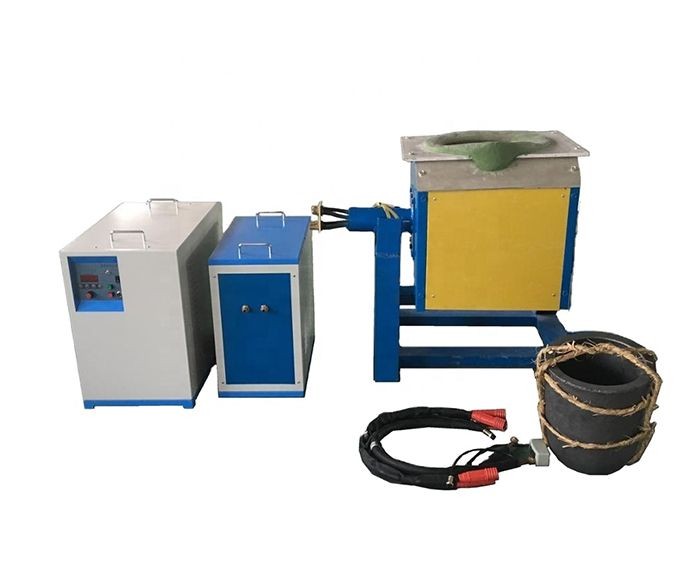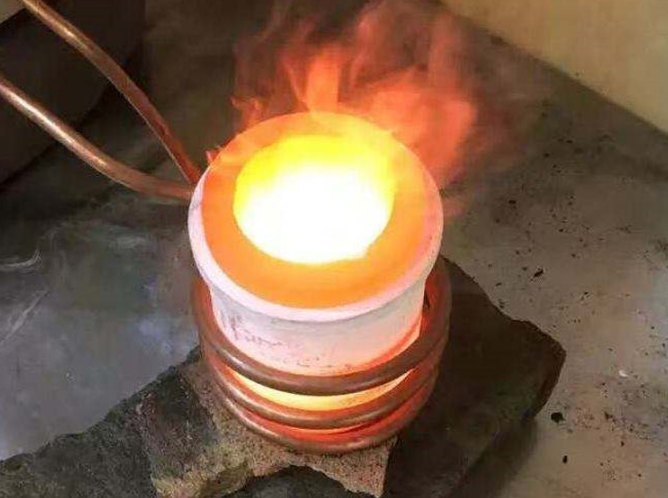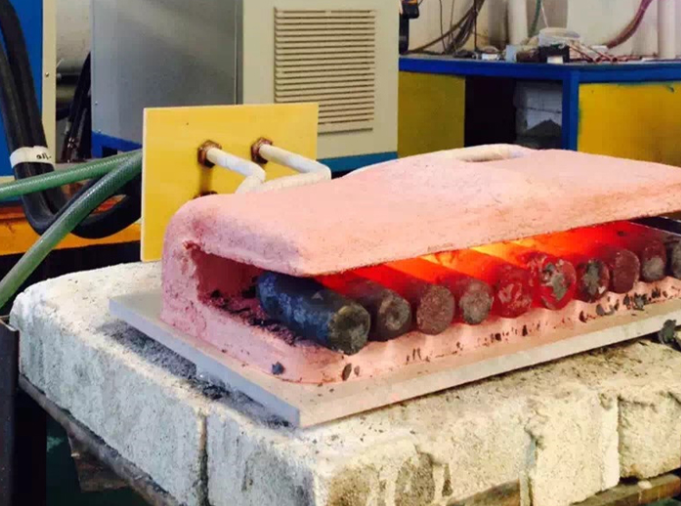1. Core Working Principle of Induction Melting Furnaces
Induction melting furnaces utilize electromagnetic induction to heat and melt conductive materials without direct contact. Here's the science behind it:
◆ Faraday's Law of Induction: A high-frequency alternating current (AC) passes through a copper coil, generating a fluctuating magnetic field.
◆ Eddy Currents & Resistance Heating: When a conductive material (e.g., metal) is placed within this field, eddy currents are induced in the material. These currents generate heat due to the material’s electrical resistance, rapidly raising its temperature until melting occurs.
◆ Hysteresis Losses (Ferromagnetic Materials): For metals like iron or nickel, additional heat is produced as their magnetic domains realign with the changing magnetic field.
This process ensures rapid, uniform heating with minimal energy waste, making it ideal for precision applications.
2. Key Components of an Induction Melting Furnace
Modern induction furnaces, such as those by Hitfar Group and Amelt, are engineered with advanced components for reliability and performance:
◆ Crucible: A high-temperature-resistant container (ceramic or graphite) that holds the metal charge. Graphite crucibles enable direct induction heating of both the crucible and feedstock.
◆ Induction Coil: Water-cooled copper coils generate the magnetic field. Hitfar’s coils use Siemens/Fuji IGBT modules for unmatched efficiency and durability.
◆ Power Supply: Converts standard electrical input into high-frequency AC (50 Hz to 1100 kHz). Higher frequencies enable faster melting for smaller batches.
◆ Cooling System: Closed-loop water cooling prevents overheating, ensuring consistent operation.
◆ Control Panel: Enables precise temperature regulation, automation, and integration with auxiliary systems like ultrasonic atomizers.
3. Advantages That Matter to Buyers
Induction melting furnaces outperform traditional methods (arc furnaces, gas-fired kilns) in critical areas:
Energy Efficiency & Cost Savings
◆ 30–80% Energy Savings: Hitfar's electromagnetic induction systems reduce electricity consumption through optimized frequency control and zero standby heat loss.
◆ No Electrodes/Fuel Required: Lowers operational costs and eliminates fuel-handling risks.
Superior Metal Quality
◆ Zero Contamination: Heat originates from the material itself, avoiding impurities from external sources.
◆ Electromagnetic Stirring: Ensures uniform alloy composition and temperature distribution.
Environmental Compliance
◆ Zero Emissions: No dust, fumes, or loud noise, aligning with global sustainability standards.
◆ Recycling-Friendly: Efficiently melts scrap metal with minimal oxidation loss.
Flexibility & Scalability
◆ Broad Material Compatibility: Small induction furnace melts ferrous metals (steel, iron), non-ferrous metals (Al, Cu, Au, Ag), and refractory alloys.
◆ Customizable Designs: Hitfar offers tailored solutions for capacity (1 kg to 3000 kg), frequency, and automation needs.
4. Applications Across Industries
Induction furnaces are indispensable in:
◆ Foundries & Metal Casting: High-purity melting for automotive, aerospace, and machinery components.
◆ Precious Metal Refining: Gold, silver, and platinum processing with minimal material loss.
◆ Recycling: Efficient scrap metal reprocessing for circular economy initiatives.
◆ Advanced Manufacturing: Integration with ultrasonic atomizers (e.g., rePowder systems) for spherical metal powder production (3D printing, thermal spraying).

medium frequency induction furnace
5. Why Choose Hitfar Induction Melting Solutions?
As a leader with 20+ years of R&D expertise, Hitfar delivers unmatched value:
Cutting-Edge Technology
◆ Patented Designs: Including electromagnetic die-casting furnaces (Patent Nos. 201220708391.9, 201320015956) for superior thermal management.
◆ Multi-Frequency Options: From 0.4 kHz (deep penetration for large volumes) to 1100 kHz (rapid melting for small batches).
Global Support & Reliability
◆ ISO 9001-Certified Production: Rigorous quality control ensures long-term durability.
◆ 24/7 Technical Assistance: On-site installation, operator training, and spare parts supply (thyristors, capacitors, CNC tooling).
Sustainable ROI
◆ Fast ROI: Reduced energy costs and maintenance extend furnace lifespan.
◆ Future-Ready Automation: Seamless integration with Industry 4.0 systems for smart foundries.
6. Buyer's Checklist: What to Evaluate
When selecting an induction furnace, prioritize:
◆ Melting Capacity & Speed: Match frequency and power to your production volume.
◆ Material Compatibility: Verify crucible material (graphite for non-reactive metals, ceramics for high-purity needs).
◆ Energy Efficiency Ratings: Compare kW/kg metrics and cooling system design.
◆ After-Sales Service: Ensure local technical support and warranty coverage.
◆ Compliance: Check certifications (CE, RoHS) and environmental standards.
Hitfar's induction melting furnaces redefine efficiency, quality, and sustainability. With customizable solutions for industries ranging from automotive to additive manufacturing, we empower businesses to achieve higher productivity while reducing their carbon footprint.
Contact Hitfar today to explore how our induction heating systems can transform your metal processing workflows.






